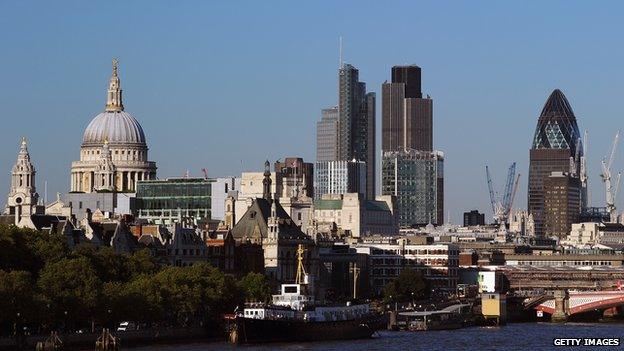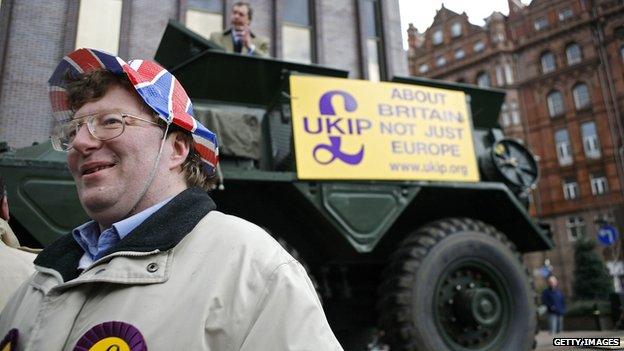The rise of 'cosmopolitan' politics
- Published

London is usually seen as a cosmopolitan city
The rise of UKIP heralds the emergence of a new divide in British politics, with cosmopolitan voters on one side and non-cosmopolitan ones on the other, argues Jeremy Cliffe.
We hear a lot about UKIP these days. The party stole the show at the local and European elections last year, then again in the autumn when it lured two Conservative MPs to defect.
In the past weeks alone there have been three much-discussed television programmes about the party: "Meet the Ukippers", "Farage Fans and UKIP Lovers" and "100 Days of UKIP".
At the upcoming general election the party will probably increase its share of seats in Westminster - and will certainly affect the results in dozens of other constituencies by taking votes from the other parties.
But ask some of those academics who have been watching UKIP's rise, and they will tell you that it is just one part of a bigger story.
We are all used to the left-right divide in politics: a spectrum of different views on how much the government should tax, spend, regulate and otherwise intervene in the economy.
But according to Dr Rob Ford of Manchester University, UKIP exists on a different axis, one to do with cultural rather than economic matters.
This new political scale is ever more prominent in British political life.
On the one end of it is what you might call a "cosmopolitan" philosophy: a relaxed, liberal attitude to issues concerning national identity (like immigration) and to questions of morality and lifestyle (like gay marriage).
On the other end is a "non-cosmopolitan" outlook: more nationalist, socially conservative and less comfortable with social change, or in other words the ideological stance often associated with typical UKIP voters.
This divide cuts across the left-right scale: there are cosmopolitan and non-cosmopolitan voters in both the Conservative and the Labour camps, which is why UKIP takes support from both.
Important divide
Lots of things are making this cosmopolitanism divide more important.
One is that the old class-based, ideological conflict between left and right has declined. Dr James Tilley of Oxford University argues that politicians are partly to blame.
The economic philosophies of the Conservative and Labour parties are so similar, he argues, that other, cultural issues are becoming more important.
Another factor is the growing gap between the generations: the difference in outlook between the cosmopolitan young and less cosmopolitan, older voters is greater than it was in the past (partly due to the recent rise in levels of university education, which tend to correlate with liberal views).

UKIP are hoping to make political gains in many parts of the country
This trend presents the established parties with some difficult questions.
As Dr Ford puts it, they "have to try and deal with this rising value divide, particularly now that UKIP has mobilised it into the political debate."
"They have to make a move," he adds, "but any move that they make risks making their position worse with one or the other of these groups of voters."
Sound too cosmopolitan, and the parties risk losing supporters to UKIP.
Try to "out-UKIP UKIP", and they could alienate their younger, more socially liberal supporters.
So both are doing the political splits, trying to reconcile the cosmopolitans within their ranks with the non-cosmopolitans.
Witness the tortuous attempts by Ed Miliband to sound tough on immigration without sounding too tough.
Witness, too, the recent struggles of David Cameron to persuade social conservatives in his party that gay marriage can be an innately conservative institution.
In the long-term, this divide will become less problematic.
That is because over the years the country will tilt towards the cosmopolitan end of this new spectrum. So says Penny Young of NatCen, the research organisation that conducts the extensive British Social Attitudes survey.
Demographic changes
Various demographic factors explain this trend.
The country as a whole is becoming more accepting of same-sex relationships.
Younger voters are more relaxed about things like immigration and national identity than were previous generations when they were young, suggesting that the overall population will tilt in an internationalist direction over time.
And ever more parts of the country are acquiring the ethnic and social diversity once confined to the inner cities, a trend that generally makes people more comfortable with immigration.
According to Dr Ford the question is therefore: how should the main political parties navigate this period of transition?
It would be wrong to simply abandon the swathes of voters at the less cosmopolitan end of the scale; voters who are usually older and more isolated than the average member of the population.
Yet the politicians do need to adapt to the changing attitudes of British society and be honest with voters rather than pandering to views that, deep down, they do not share.
This quandary may not decide the upcoming general election, but in the established parties savvy strategists with an eye to elections in 2020 and beyond are grappling with it nonetheless.
That is a wise move.